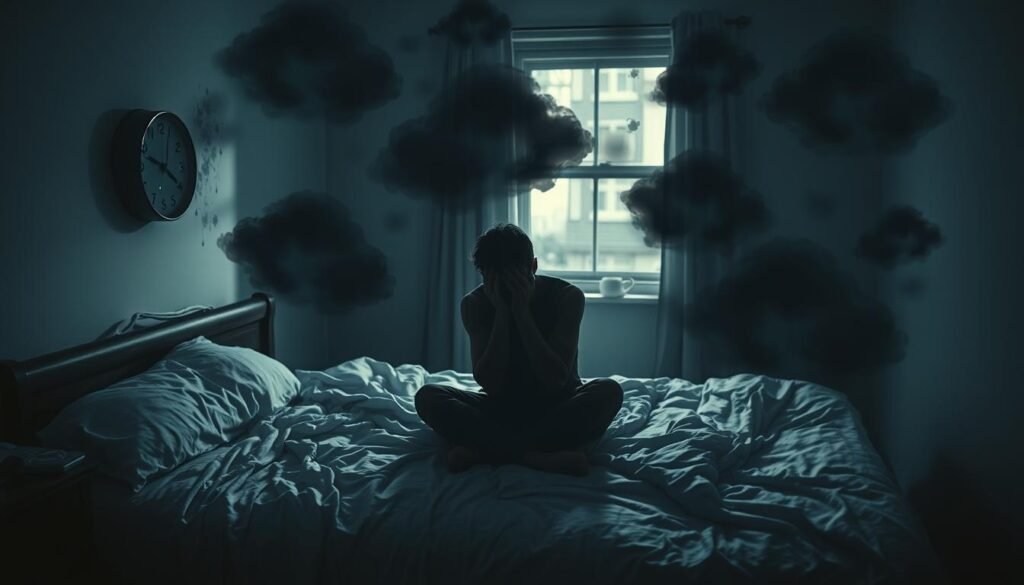Insomnia affects about 35% of adults, making it a common sleep disorder. People with this issue have a hard time getting to sleep, staying asleep, or wake up too early. This leads to feeling tired during the day and can hurt mental health. Most adults need 7 to 9 hours of good sleep each night, but often, they can’t get enough.
There are two types of insomnia: acute and chronic. Acute insomnia lasts a short time, while chronic insomnia happens at least three nights a week for over three months. This guide will explore various reasons for insomnia, including lifestyle and health issues. Knowing what causes this can help people sleep better overall.
Key Takeaways
- Insomnia affects approximately 35% of adults in America.
- Most adults need 7 to 9 hours of sleep each night.
- Insomnia can be acute or chronic, with different underlying causes.
- Poor sleep hygiene significantly contributes to insomnia symptoms.
- Reduced sleep can severely impact mental health and quality of life.
- Women and older individuals are at a higher risk for insomnia.
- Stress and lifestyle choices are common triggers for insomnia episodes.
Understanding Insomnia
Millions struggle with insomnia, a sleep disorder that messes with both falling asleep and staying asleep. An insomnia definition covers struggles in both getting to sleep and keeping it through the night. It can be short-term or chronic, influenced by stress and lifestyle.
The insomnia effects touch many parts of life. They lower energy, affect thinking, change moods, and harm health. People with insomnia often find they can’t fall asleep easily. They might wake up a lot or feel tired and cranky during the day.
- Difficulty falling asleep
- Frequent awakenings during the night
- Daytime fatigue and irritability
Research shows many occasionally have insomnia, while 10% to 15% have it chronic. Things like family history, age, and gender can make it more likely. Causes range from health issues to mood disorders and bad sleep habits.
For chronic insomnia, Cognitive Behavioral Therapy (CBT-I) is a top treatment. It includes lifestyle tweaks, meds, and mental health care to improve sleep quality. Knowing the different treatment options can help people manage their insomnia for better sleep.
| Type of Treatment | Description | Examples |
|---|---|---|
| Lifestyle Changes | Adopting habits to promote better sleep. | Regular sleep schedule, relaxation techniques |
| Medications | Pharmaceutical options to assist with sleep. | Benzodiazepines, melatonin-related drugs |
| Mental Healthcare | Addressing underlying psychological factors affecting sleep. | Cognitive Behavioral Therapy (CBT-I) |
| Herbal Remedies | Natural supplements to support sleep. | Chamomile, valerian root |
Common Types of Insomnia
Knowing about insomnia types helps us find the right treatment. Insomnia shows up in various ways, with each having its own features. The main kinds include acute, chronic, sleep-onset, sleep-maintenance, and paradoxical insomnia. These categories help us understand the different sleep problems people have.
Acute Insomnia
Acute insomnia is short-term, lasting a few days to weeks. It’s often caused by stress from big life changes or the environment. People with this condition usually get better without needing a lot of treatment.
Chronic Insomnia
Chronic insomnia means having trouble sleeping at least three nights a week for over three months. It can come from many causes like mental health issues, chronic stress, or health problems. People with chronic insomnia often need detailed treatment to get better sleep.
Sleep-Onset Insomnia
This type makes it hard to fall asleep at bedtime. Anxiety and irregular sleep schedules are common causes. Solving these problems can improve falling asleep.
Sleep-Maintenance Insomnia
Sleep-maintenance insomnia causes frequent wake-ups at night. Health issues or stress can trigger it. It leads to poor sleep quality as people wake up often and find it hard to sleep again.
Paradoxical Insomnia
Paradoxical insomnia involves a big difference between felt sleep and actual sleep. People may think they’ve slept little, even when they’ve gotten enough. This issue makes diagnosis and treatment challenging.
What Causes Insomnia Meaning
Insomnia is a common sleep problem caused by many factors. Psychological issues like anxiety and stress are major causes of insomnia. Lifestyle habits, including irregular sleep schedules and poor sleep hygiene, also lead to sleep problems. It’s vital to know your specific insomnia triggers to manage them well.
Physical health plays a big role too. Conditions such as asthma, acid reflux, and chronic pain can worsen sleep issues. Both prescription and over-the-counter medications may affect sleep quality. Noise and temperature are environmental factors that can also make sleeping hard. Health experts recommend seeing a sleep specialist for a diagnosis and personalized solutions.
Different people face different challenges with insomnia, especially older adults and shift workers. Knowing these challenges helps in finding effective treatments. For more about managing insomnia, here’s a helpful resource.
Stress as a Major Contributor
Stress is key in causing insomnia, especially with big life events and work stress. Studies show that up to two-thirds of adults may have insomnia sometime. And 10% to 15% feel worse during the day because they didn’t sleep enough.
Impact of Work and Life Events
Short-term insomnia can come from stresses like fights, job problems, money issues, and losing someone close. These stresses can mess up how we sleep right away. If stress stays around, you might get chronic insomnia. This means you have sleep trouble three times a week for over three months. Big reasons include ongoing work problems or big changes in life.
Chronic Stress and PTSD
For those with PTSD, chronic stress makes insomnia worse. It keeps them in a state of high alert, which hurts sleep quality. High stress levels mess with deep sleep and REM sleep, making a cycle of not sleeping well. Stress over time can also lead to serious issues like high blood pressure and heart disease. So, it’s crucial to tackle stress-related health problems.

Irregular Sleep Schedules and Circadian Rhythm
Disruptions in the circadian rhythm impact sleep quality deeply. Irregular sleep habits come from tough work hours or changes in time zones. This messes with our body’s natural cycles. People changing work shifts or traveling a lot often struggle to sleep well. This can lead to different insomnia causes.
To diagnose irregular sleep-wake syndrome, one needs three odd sleep-wake times in a day. These episodes are usually 1 to 4 hours apart. Though it’s uncommon, symptoms include feeling very sleepy during the day. This leads to taking many naps, which affects overall health.
Handling erratic sleep patterns is key for mental and physical well-being. Those especially at risk include individuals with conditions like dementia or Parkinson’s disease. Treatments might involve bright light therapy, better sleep habits, and a regular sleep timetable. Adjusting light exposure, cutting down on caffeine, and setting up a good sleep space can help fix the circadian rhythm.
Sleep loss can be dangerous. It raises the chance of accidents and health problems like heart disease and diabetes. Knowing how sleep schedules affect mood shows why a good sleep routine is crucial.
For more info, check out the effects of sleep loss on mood at this resource.
| Factor | Description |
|---|---|
| Diagnosis Criteria | At least 3 abnormal sleep-wake episodes in a 24-hour period |
| Episodes Duration | 1 to 4 hours between episodes |
| Common Symptoms | Excessive daytime sleepiness, multiple naps |
| Risk Factors | Dementia, Parkinson’s, traumatic brain injury |
| Treatment Options | Bright light therapy, sleep hygiene, medication |
| Health Risks | Increased risk of accidents, heart disease |
Lifestyle Factors Affecting Sleep
Our daily choices greatly affect how well we sleep. This includes our routines before bed, what we eat, and any substances we use. Knowing more about these can help us sleep better.
Poor Sleep Hygiene
Good sleep hygiene is essential for fighting insomnia. Habits like irregular sleep times and stimulating activities before bed can harm our sleep. To improve sleep quality, try a calming routine before bed. This can help prevent insomnia over time. It should include:
- Keeping a regular sleep schedule
- Avoiding screens at least an hour before sleep
- Ensuring a comfy sleeping environment
Dietary Choices
What we eat affects our sleep more than we think. Eating heavy or sugary snacks, or drinking caffeine late can keep us awake. Eating healthier can help reduce insomnia symptoms. Here are some tips:
- Have lighter dinners
- Try sleep-friendly foods like almonds or cherries
- Watch your overall nutrition for better sleep
Substance Use
Using substances like caffeine, nicotine, and alcohol can mess up our sleep. Cutting back on them, especially before bed, is good for our sleep hygiene. While alcohol might seem helpful at first, it can disrupt sleep later on. Here’s what can help improve sleep:
- Reduce caffeine after mid-afternoon
- Avoid nicotine before sleeping
- Keep alcohol to a minimum in the evening

Mental Health Disorders and Their Link to Insomnia
Exploring how mental health issues relate to sleep uncovers a troubling pattern. Many dealing with anxiety and depression find sleeping hard. About 50–80% of adults with mental issues have trouble sleeping yearly. This leads to a harmful insomnia connection that worsens their mental distress.
Anxiety and Depression
Anxiety disorders, like generalized anxiety disorder (GAD), affect many people. Sleep problems are a key sign of anxiety, with up to 36% of those with insomnia feeling anxious. Depression has a similar effect; most people with major depressive disorder (MDD) struggle with sleep. Addressing both anxiety or depression and insomnia is crucial for health. For tips on managing anxiety and sleep issues, click here.
Other Mental Health Issues
Other mental health problems also cause insomnia. PTSD and bipolar disorder often disrupt sleep. A 2020 study shows nearly 90% with PTSD have insomnia, as do 80-90% facing bipolar disorder. Insomnia might even increase the risk of these conditions. For instance, those with mental health challenges are twice as likely to have insomnia. People with OCD are nearly seven times more apt to get diagnosed with insomnia. This underscores the deep link between mental health and sleep quality.
Physical Illnesses and Pain
Having a physical health issue can make it hard to sleep well. Many health problems can mess up sleep or lead to insomnia. It’s important to understand how they’re connected to manage them well.
Common Medical Conditions
Some health issues can really affect how well you sleep. These include:
- Allergies
- Asthma
- Arthritis
- Diabetes
- Gastrointestinal disorders
About 30% of adults say they have symptoms of insomnia. A lot of them also have chronic health problems. For example, 55% of people with gut issues like IBS and GERD also have trouble sleeping. These health problems can make each other worse, making a tough cycle.
Impact of Pain on Sleep Quality
Dealing with chronic pain can make sleeping well really hard. Conditions like arthritis and fibromyalgia can stop you from getting to sleep or staying asleep. There’s a big connection between pain and poor sleep, with many reporting it affects their sleep quality a lot.
Statistics show that people with chronic issues often have insomnia. Like, 75% to 90% of those with insomnia also have other medical problems. Sleeping better might help with pain management. It can make you feel better overall.
| Medical Condition | Impact on Sleep |
|---|---|
| Arthritis | Increased pain leading to difficulty falling asleep |
| Fibromyalgia | Widespread pain disrupting sleep patterns |
| Gastrointestinal Disorders | Increased risk of insomnia in affected individuals |
| Diabetes | Complications can lead to sleep disturbances |
| Pregnancy | Hormonal changes and physical discomfort affecting sleep |
Managing these health issues well can lessen pain and insomnia. This, in turn, can make sleep better for many people.
Medications that Disrupt Sleep
Some medications and insomnia are closely linked, leading to sleep problems. These include heart medications like alpha-blockers and beta-blockers. They can mess up REM sleep and lower melatonin levels. This can make your sleep worse.
SSRIs for depression and anxiety often cause insomnia. Statins for cholesterol can make muscles ache, disrupting sleep. Those taking cholinesterase inhibitors for Alzheimer’s might not sleep well and have bad dreams.
Medicines like theophylline for asthma can also cause sleep issues. Non-drowsy antihistamines and decongestants may lead to anxiety. Caffeinated pain relievers and weight loss drugs can keep you awake at night.
Even glucosamine, chondroitin, and multivitamins can affect sleep. Making small changes in when you take medicine might help with medication-induced insomnia.
Sticking to a regular sleep schedule, exercising, and making your bedroom comfy can improve your sleep. But, sleeping pills might make sleep apnea worse. Surprisingly, over 17% of Americans took medicines that could disrupt sleep in 2016.
Benzodiazepines can lead to sleepwalking, especially in high doses. Melatonin can help with medications and insomnia but might cause nightmares. The role of B vitamins in sleep is still unclear. Some research shows they help, others say they don’t.
Knowing how medicines impact sleep can help you make smart health choices. Always talk to your doctor if you’re worried about how meds affect your sleep. It’s key for good sleep hygiene.
Environmental Disturbances
External factors greatly affect how well we sleep. The link between our environment and sleep is strong. It determines if we have peaceful rest or troubled nights. Noise, especially from cars and planes, disrupts sleep for both kids and adults.
Noise at night can cause bad changes in our bodies. It messes up our sleep patterns. This can lead to less deep sleep stages and shallower sleep. People dealing with these issues often feel sleepy during the day. They might get easily annoyed and struggle with thinking clearly. Such problems don’t just affect us now. Over time, they can lead to serious health issues like obesity, diabetes, and high blood pressure.
Kids are more affected by these sleep disruptions. They might have learning problems and show more ADHD symptoms. Research shows that noise is more than annoying. It’s a health hazard, leading to heart and mental health issues.
To lessen these effects, we can use some strategies. Soundproofing our rooms, using blackout curtains, and making our beds comfy can help. It’s important to create a quiet place for sleep. Recognizing the link between good sleep and health is becoming more common.

It’s key to know how our surroundings affect our sleep. Improving sleep through better environments is vital for our health. This step is crucial for better public health.
Insomnia in Specific Populations
It’s key to understand how insomnia varies across different groups for effective help. Groups like the elderly, children, teenagers, and pregnant people face unique sleep challenges. For older people, insomnia often comes with aging. Younger ones, including kids and teens, might have sleep problems due to lifestyle. Pregnant women face sleep issues from hormone changes and discomfort.
Insomnia and Aging
Elderly people may struggle with insomnia due to changes in how they sleep. This could be due to health issues or side effects of medicines. Less efficient sleep leads to more disturbances at night. Key factors for insomnia in seniors include:
- Chronic pain or medical conditions
- Side effects from medications, including benzodiazepines and other controlled drugs
- Changes in lifestyle and activity levels
To tackle insomnia in the elderly, a broad approach is taken. This accounts for all these factors and fosters healthy sleep routines.
Insomnia in Children and Teens
For kids and young adults, things like school stress and bad sleep habits can lead to insomnia. Insomnia in children can show as avoiding bedtime or sleep issues harming school work. Sleep troubles in teens often come from:
- Delayed sleep phase syndrome
- Increased screen time before bed
- Emotional or mental health challenges
Identifying these issues is crucial. It helps in developing sleeping solutions for healthier young lives.
Insomnia During Pregnancy
Expectant mothers experience many changes that may cause insomnia. They deal with sleep issues like:
- Hormonal fluctuations affecting sleep patterns
- Physical discomfort such as back pain and frequent urination
- Anxiety and concerns about parenthood
Supporting pregnant people in managing these aspects is key. It ensures they can get a good night’s sleep.
| Population | Common Causes of Insomnia | Potential Solutions |
|---|---|---|
| Elderly | Health conditions, medications, lifestyle changes | Behavioral therapy, medication adjustments |
| Children | Stress, bedtime resistance, lifestyle factors | Consistent sleep schedule, stress management |
| Teens | Screen time, mental health issues, irregular habits | Sleep environment optimization, relaxation techniques |
| Pregnant Individuals | Hormonal changes, physical discomfort, anxiety | Sleep position adjustments, relaxation exercises |
Conclusion
Getting to the bottom of insomnia’s complex causes is key to better sleep. Studies indicate that 2.3% to 25.5% of people worldwide suffer from insomnia. This condition can lead to emotional issues due to lack of sleep. These issues include trouble managing emotions.
Insomnia’s toll in the United States costs about $100 billion each year. Therefore, tackling insomnia is urgent. Mental health, lifestyle, and where you live all affect sleep. Knowing this helps people improve their sleep habits.
Poor sleep habits, emotional problems, and health issues can make insomnia worse. This shows why a full treatment plan is critical. Also, insomnia might signal bigger mental health concerns. This means treatment strategies need to be well-informed.
To find help, focus on making your sleeping area better and caring for your mental health. Better sleep can be achieved without feeling overwhelmed. Making smart choices is the first step. For tips on treating insomnia, click here. Realizing how complex insomnia is and using available resources can improve sleep and life quality.